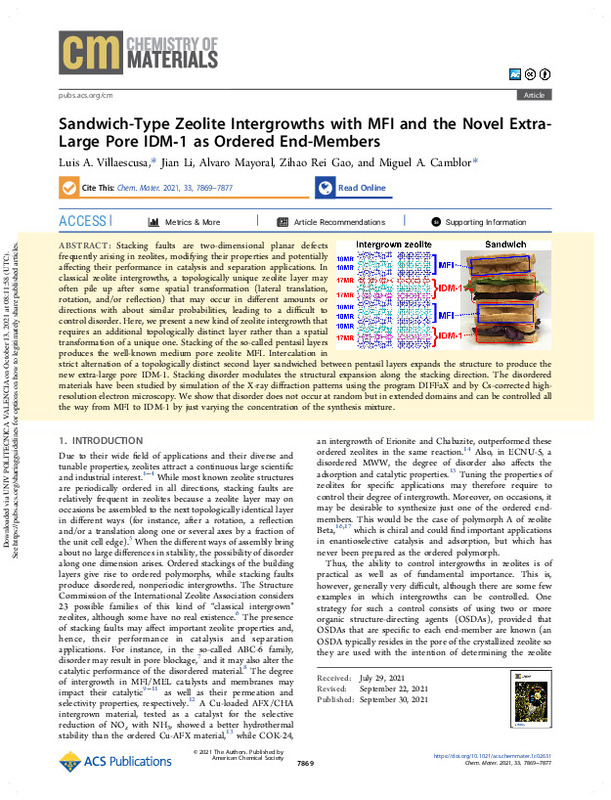JavaScript is disabled for your browser. Some features of this site may not work without it.
Buscar en RiuNet
Listar
Mi cuenta
Estadísticas
Ayuda RiuNet
Admin. UPV
Sandwich-Type Zeolite Intergrowths with MFI and the Novel Extra-Large Pore IDM-1 as Ordered End-Members
Mostrar el registro sencillo del ítem
Ficheros en el ítem
| dc.contributor.author | Villaescusa Alonso, Luis Angel
|
es_ES |
| dc.contributor.author | Li, Jian
|
es_ES |
| dc.contributor.author | Mayoral, Alvaro
|
es_ES |
| dc.contributor.author | Gao, Zihao Rei
|
es_ES |
| dc.contributor.author | Camblor, Miguel A.
|
es_ES |
| dc.date.accessioned | 2023-09-21T18:05:36Z | |
| dc.date.available | 2023-09-21T18:05:36Z | |
| dc.date.issued | 2021-10-12 | es_ES |
| dc.identifier.issn | 0897-4756 | es_ES |
| dc.identifier.uri | http://hdl.handle.net/10251/196913 | |
| dc.description.abstract | [EN] Stacking faults are two-dimensional planar defects frequently arising in zeolites, modifying their properties and potentially affecting their performance in catalysis and separation applications. In classical zeolite intergrowths, a topologically unique zeolite layer may often pile up after some spatial transformation (lateral translation, rotation, and/or reflection) that may occur in different amounts or directions with about similar probabilities, leading to a difficult to control disorder. Here, we present a new kind of zeolite intergrowth that requires an additional topologically distinct layer rather than a spatial transformation of a unique one. Stacking of the so-called pentasil layers produces the well-known medium pore zeolite MFI. Intercalation in strict alternation of a topologically distinct second layer sandwiched between pentasil layers expands the structure to produce the new extra-large pore IDM-1. Stacking disorder modulates the structural expansion along the stacking direction. The disordered materials have been studied by simulation of the X-ray diffraction patterns using the program DIFFaX and by Cs-corrected high-resolution electron microscopy. We show that disorder does not occur at random but in extended domains and can be controlled all the way from MFI to IDM-1 by just varying the concentration of the synthesis mixture. | es_ES |
| dc.description.sponsorship | The authors thank funding from the Spanish Ministry of Science, Innovation and Universities, under Projects MAT2015-71117-R (MINECO/FEDER, UE), PID2019105479RB-I00 and RTI2018-101599-B-C22 (MCUI/AEI/ FEDER, UE), the Swedish Research Council (VR), and the Knut and Alice Wallenberg Foundation (KAW). L.A.V. also thanks the Generalitat Valenciana (project PROMETEO/ 2018/024). A.M. acknowledges the Spanish Ministry of Science (RYC2018-024561-I) and the Regional government of Aragon (DGA E13_20R), the National Natural Science Foundation of China (NFSC-21850410448 and NSFC21835002), and the Centre for High-resolution Electron Microscopy (C.EM), supported by SPST of ShanghaiTech University under contract No. EM02161943. | es_ES |
| dc.language | Inglés | es_ES |
| dc.publisher | American Chemical Society | es_ES |
| dc.relation.ispartof | Chemistry of Materials | es_ES |
| dc.rights | Reconocimiento (by) | es_ES |
| dc.subject.classification | QUIMICA INORGANICA | es_ES |
| dc.title | Sandwich-Type Zeolite Intergrowths with MFI and the Novel Extra-Large Pore IDM-1 as Ordered End-Members | es_ES |
| dc.type | Artículo | es_ES |
| dc.identifier.doi | 10.1021/acs.chemmater.1c02631 | es_ES |
| dc.relation.projectID | info:eu-repo/grantAgreement/AEI/Plan Estatal de Investigación Científica y Técnica y de Innovación 2017-2020/PID2019-105479RB-I00/ES/MATERIALES FUNCIONALES A PARTIR DE RECURSOS NATURALES PARA SOLUCIONES SOSTENIBLES EN ENERGIA, MEDIOAMBIENTE Y SALUD/ | es_ES |
| dc.relation.projectID | info:eu-repo/grantAgreement/GENERALITAT VALENCIANA//PROMETEO%2F2018%2F024//SISTEMAS AVANZADOS DE LIBERACION CONTROLADA/ | es_ES |
| dc.relation.projectID | info:eu-repo/grantAgreement/AEI/Plan Estatal de Investigación Científica y Técnica y de Innovación 2017-2020/RTI2018-101599-B-C22/ES/DESARROLLO Y APLICACION DE SISTEMAS ANTIMICROBIANOS PARA LA INDUSTRIA ALIMENTARIA BASADOS EN SUPERFICIES FUNCIONALIZADAS Y SISTEMAS DE LIBERACION CONTROLADA/ | es_ES |
| dc.relation.projectID | info:eu-repo/grantAgreement/NSFC//21835002/ | es_ES |
| dc.relation.projectID | info:eu-repo/grantAgreement/MINECO//MAT2015-71117-R/ES/NUEVAS ARQUITECTURAS HIBRIDAS MEDIANTE ENSAMBLADO CONTROLADO DE NANOMATERIALES/ | es_ES |
| dc.relation.projectID | info:eu-repo/grantAgreement/NSFC//21850410448/ | es_ES |
| dc.relation.projectID | info:eu-repo/grantAgreement/Gobierno de Aragón//DGA E13-20R/ | es_ES |
| dc.relation.projectID | info:eu-repo/grantAgreement/MICINN//RYC2018-024561-I/ | es_ES |
| dc.relation.projectID | info:eu-repo/grantAgreement/ShanghaiTech University//EM02161943/ | es_ES |
| dc.rights.accessRights | Abierto | es_ES |
| dc.contributor.affiliation | Universitat Politècnica de València. Escuela Técnica Superior de Ingenieros Industriales - Escola Tècnica Superior d'Enginyers Industrials | es_ES |
| dc.description.bibliographicCitation | Villaescusa Alonso, LA.; Li, J.; Mayoral, A.; Gao, ZR.; Camblor, MA. (2021). Sandwich-Type Zeolite Intergrowths with MFI and the Novel Extra-Large Pore IDM-1 as Ordered End-Members. Chemistry of Materials. 33(19):7869-7877. https://doi.org/10.1021/acs.chemmater.1c02631 | es_ES |
| dc.description.accrualMethod | S | es_ES |
| dc.relation.publisherversion | https://doi.org/10.1021/acs.chemmater.1c02631 | es_ES |
| dc.description.upvformatpinicio | 7869 | es_ES |
| dc.description.upvformatpfin | 7877 | es_ES |
| dc.type.version | info:eu-repo/semantics/publishedVersion | es_ES |
| dc.description.volume | 33 | es_ES |
| dc.description.issue | 19 | es_ES |
| dc.relation.pasarela | S\447221 | es_ES |
| dc.contributor.funder | Gobierno de Aragón | es_ES |
| dc.contributor.funder | GENERALITAT VALENCIANA | es_ES |
| dc.contributor.funder | ShanghaiTech University | es_ES |
| dc.contributor.funder | Swedish Research Council | es_ES |
| dc.contributor.funder | AGENCIA ESTATAL DE INVESTIGACION | es_ES |
| dc.contributor.funder | Agencia Estatal de Investigación | es_ES |
| dc.contributor.funder | European Regional Development Fund | es_ES |
| dc.contributor.funder | Ministerio de Ciencia e Innovación | es_ES |
| dc.contributor.funder | Knut and Alice Wallenberg Foundation | es_ES |
| dc.contributor.funder | Ministerio de Economía y Competitividad | es_ES |
| dc.contributor.funder | National Natural Science Foundation of China | es_ES |








